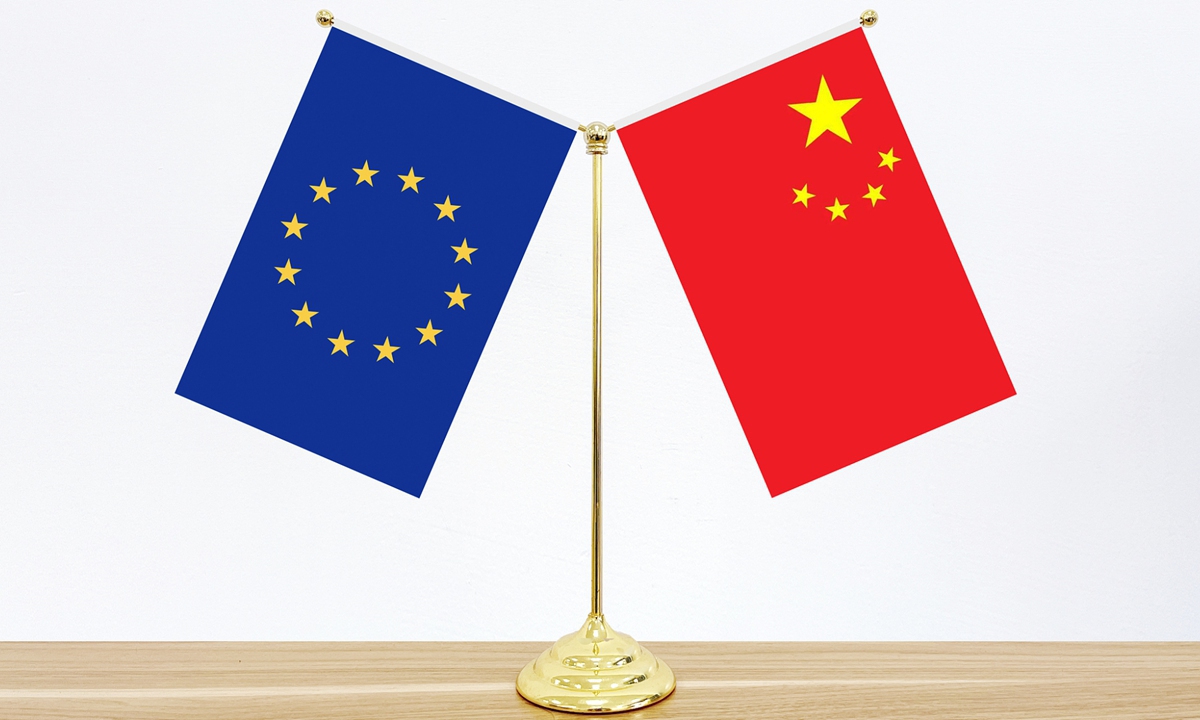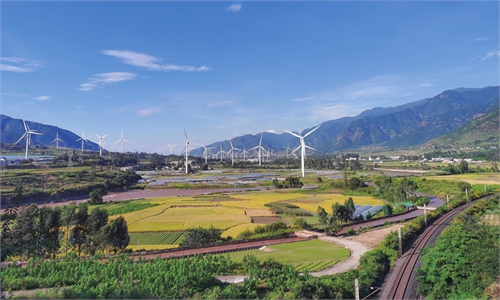EU probe of Chinese wind turbines 'protectionist' behavior: MOFCOM
Investigation distorts definition of subsidies, lacks transparency

China EU Photo:VCG
China's Ministry of Commerce (MOFCOM) in the wee hours of Thursday slammed the EU's planned probe into Chinese wind turbines. The ministry said the EU investigation distorts the definition of subsidies, lacks transparency, and is protectionist behavior that harms fair competition.
The EU on Tuesday announced it would launch a subsidy investigation into Chinese wind turbine suppliers in several EU countries, as the bloc steps up trade protectionism against China's new-energy industries.
The move drew deep concerns from Chinese officials, business groups and experts. They said that it showed the rising tendency of protectionism in the EU. They urged the bloc to abandon protectionist practices and return to the path of win-win cooperation.
The probe announced on Tuesday would be the fourth investigation conducted by the EU under its Foreign Subsidies Regulation within two months, with a clear aim to target China's new-energy companies. It will damage mutually beneficial cooperation between China and Europe, said a MOFCOM official in a meeting with Martin Lukas, director-general of the trade defense department of the European Commission, in Brussels on Wednesday, per a Xinhua News Agency report.
China urges the EU to immediately end its protectionist action and rectify the incorrect move, the Chinese official said.
MOFCOM spokesperson He Yadong also slammed the investigation on Thursday. He said that it clearly violates the principles of free trade. He emphasized that it is seriously disrupting normal cooperation between Chinese and European industries and is a typical example of protectionism.
The MOFCOM also hit back at an updated report by the EU that distorts China's policies, market environment and economic system.
The EU report covers various industries in China, including telecoms, semiconductors, railways, renewable energy and new-energy vehicles (NEVs). It's in line with the EU's recent investigations into Chinese NEVs and the latest anti-subsidy probe into Chinese wind turbines.
Protectionist moves by the EU have raised strong concerns in the business world.
"We strongly oppose any increase in tariffs on electric vehicles in China, and we look forward to continuing production and maintaining our market presence in China," Maximilian Butek, executive director at the German Chamber of Commerce in China (Shanghai), told a press conference on Wednesday.
Butek noted that Chinese NEVs account for only about 1.5 percent of the market in Europe, which is much less than the market share of German NEVs in China.
Chinese analysts said that the real aim of Western politicians and media outlets that hype the subsidies and "overcapacity" narrative seems to be the protection of their own clean-energy industries.
"Accusations of subsidies and overcapacity in China's new-energy products by Europe carry a strong protectionist tone," Cui Hongjian, a professor at the Academy of Regional and Global Governance at Beijing Foreign Studies University, told the Global Times on Thursday.
The notion of "overcapacity" should be determined by market data, rather than used as an excuse for trade protectionism. Europe's long-term competitiveness needs to be built on innovation, and excluding Chinese products does not benefit anyone, Cui said.
Helga Zepp-LaRouche, founder of Germany-based political and economic think tank the Schiller Institute, told the Global Times on Thursday that the claim of "overcapacity" is just the latest attempt to find a justification for prioritizing speculative gains over basic research and development.
"Since China has given top priority to innovation as the motor of the rejuvenation of the economy, it has a competitive advantage. It is a deplorable fact that Europe has lost its way," she said.
The MOFCOM's He told a press conference on Thursday that the EU cannot claim to care about climate change while simultaneously promoting protectionism and restricting international green trade and investment. This double standards approach will hinder the global green transition, disrupt China-EU investment cooperation, and damage mutual economic and trade trust.
Achieving an energy transition to address climate change is also a goal of Europe, and implementing trade protectionism in certain industries would undermine Europe's open and free market image, Cui said.
China hopes that Europe will abandon protectionist practices and return to the path of win-win cooperation, providing a stable, fair, transparent and predictable competitive environment for green cooperation, He noted.
There is huge potential demand for new-energy products in the global market. Taking NEVs as an example. According to an estimate by the International Energy Agency, global demand for NEVs will reach 45 million in 2030, 4.5 times the 2022 figure, and global demand for new photovoltaic capacity will reach 820 gigawatts, about four times that of 2022.

